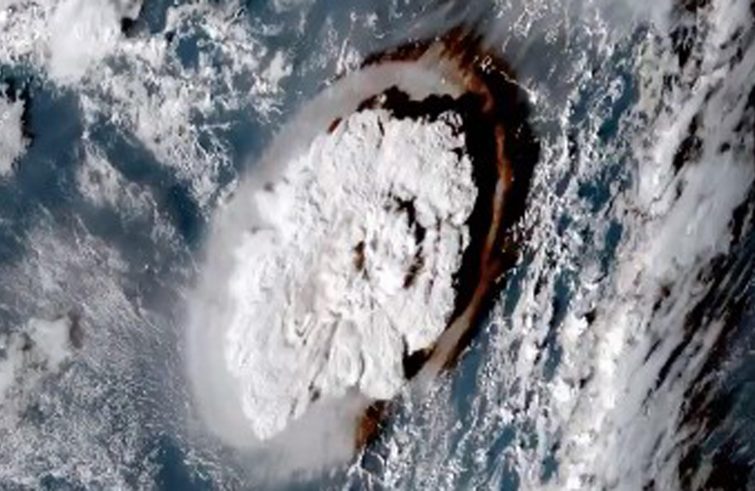
Tonga’s outer Pacific islands were hardest hit by the devastating eruption of the Hunga-Tonga Hunga-Ha’apai volcano on 15 January, one of the most violent eruptions in the region in decades, triggering tsunami alerts in several countries. NASA estimates that the eruption was more than 500 times as powerful as the nuclear bomb dropped on Hiroshima. The undersea volcano has virtually disappeared, with only two small expanses of land above sea level left. The kingdom of Tonga comprises 169 islands, but only 36 are inhabited by 100,000 people. Three deaths have been reported so far, including a British woman living on the islands. According to the International Federation of Red Cross and Red Crescent Societies (IFRC), more than 80,000 people could be stranded.
During Wednesday’s General Audience, Pope Francis extended a special thought to the people of the Tonga islands “who have been affected in recent days by the eruption of the underwater volcano, which has caused enormous material damage. I am spiritually close to all the afflicted people, imploring God for relief for their suffering. I invite everyone to join me in praying for these brothers and sisters.”
Damage wreaked on the islands. The Caritas network reports a total of 100 houses damaged and 50 destroyed on the island of Tongatapu. Completely destroyed were also all the houses on the island of Mango, while only two houses are still standing on the island of Fonoifua. Nomuka Island sustained extensive damage. There is a shortage of drinking water, contaminated by volcanic ash, with lack of shelters for displaced persons living on the coast, whose dwellings were washed away by the tsunami. Roads and bridges are severely damaged. Internal telephone communication in Tonga has been restored, but it will take at least two weeks for international calls. Communication is only possible via satellite phone.
Ash covering the Fuaamotu airport runway has caused delays in the delivery of humanitarian aids to the country. Beaches, infrastructure and homes are still blanketed in volcanic ash. Caritas Tonga, in collaboration with Carita Aotearoa/New Zealand and the local authorities, has stored supplies in warehouses in Tongatapu, Ha’apai and Vava’u. Its emergency relief items are stocked in the capital Nuku’alofa and in Ha’apai. They are
ready to distribute water purification equipment and taps, jerrycans, sanitation and first aid kits.
The coastal population has been evacuated even in Fiji and Samoa, where 50 metre-high waves caused the destruction of several houses. Caritas Tonga is managing to communicate with the international Caritas network – a first $18,000 donation has arrived – while trying to meet the needs of the population thanks to a team of voluntary workers. Caritas Italy is also keen to contribute and has already launched a fundraising campaign (for more information see here).
Fear of COVID-19. The Tonga government has declared a state of emergency and organised a distribution of water to the Ha’apai islands (the closest to the volcano), but it is also worried that Covid-19 will arrive together with the humanitarian aids. Until now, the islands have been Covid-free zones.
Caritas Australia already at work. According to Damaris Pfendt, humanitarian coordinator of the Pacific islands for Caritas Australia, the eruption of Tonga’s undersea volcano is comparable “in magnitude” to the eruption of the Indonesian volcano Krakatoa in 1883, which was one of the most violent in recorded history: “We are extremely worried”. Tonga, Caritas Australia explains, faces existing difficulties with access to clean water because it depends on groundwater and rainwater, “so this is going to leave communities in a very difficult situation”. Caritas Australia is working to assess the situation on the ground, identify the most urgent needs and raise funds to support the affected populations.
UNICEF is one of several humanitarian agencies that are struggling to respond to the disaster. “While damage to agriculture is reportedly milder than anticipated, there is concern over water supplies, clean air and fuel availability,” says UNICEF. The outbreak of water-related diseases is also a concern, as tidal waves have caused 2-3 inland blocks to flood.” Despite the setbacks, UNICEF has pre-positioned some 44 pallets of emergency relief supplies in the Australian government’s humanitarian warehouse in Brisbane, ready to be shipped to Tonga on board a Royal Australian navy ship. The shipment comprises materials for water and sanitation services, household washing kits, dignity kits, buckets, jerrycans, portable water testing kits. Fifty recreational kits have also been shipped for use in psycho-social activities for children that the Ministry of Home Affairs will be encouraged to promote through local church volunteers.
At least 28,000 children have been affected according to Save the Children. “In addition to concerns for the welbeing of families who lost their homes, there is an immediate threat to the health of children and their parents due to ash pollution in drinking water. Authorities have already reported some water sources being contaminated by ash, which can contain heavy metals like copper, cadmium and arsenic”, Save the Children made known in a statement. Shairana Ali, CEO of Save the Children Fiji, said: “the people of Pacific Island nations are sadly used to facing disasters. With seawaters having risen across the Pacific as a result of climate change, countries like Tonga and Fiji are more vulnerable than ever to tsunamis. While we are resilient and trying to adapt, it only takes a few extra meters of water to cover a house, to kill a child or family.”












